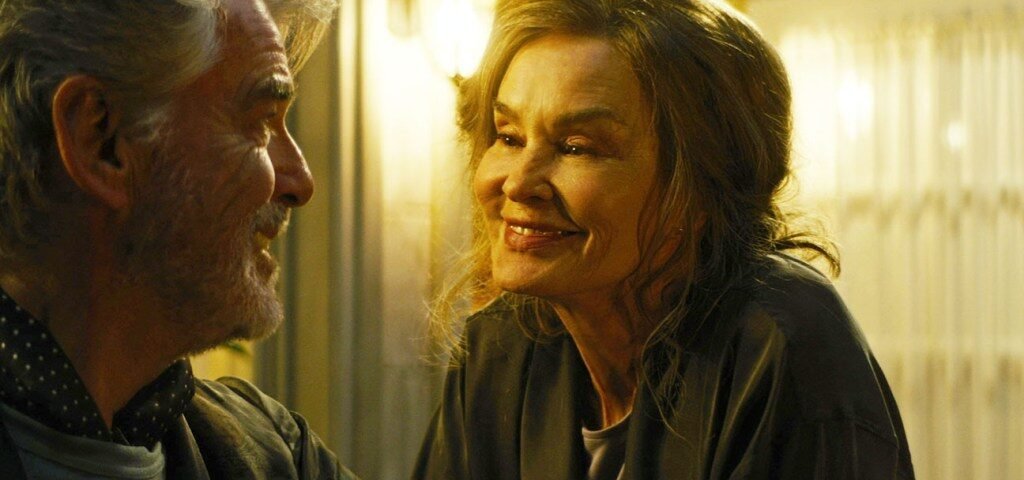


‘Santosh’ Review: Two Women Form an Unlikely Alliance in a Gripping Indian Police Procedural
May 26, 2024


‘The Seed of the Sacred Fig’ Review: Mohammad Rasoulof’s Powerful Indictment of Iranian Oppression Through the Eyes of One Unraveling Family
May 27, 2024Kathy Bates, Pierce Brosnan, Jesse Williams and Lily Rabe also star in the HBO film, directed by Michael Cristofer.
The Great Lillian Hall
Brava, Jessica.
Jessica Lange is perfection as the fictional actress Lillian Hall, known for decades as a revered star of the theater. During rehearsals for her starring role in The Cherry Orchard, she is having unusual difficulty memorizing her lines, and before long learns that the cause is early dementia. Despite that ominous theme, The Great Lillian Hall is a lovely tribute to life in the theater, with all its personal compromises, and a showcase for Lange, who deftly shows the character as a vulnerable woman and also displays the distinct style of Lillian the bravura actress.
Off stage, she is still performative but less theatrical, full of bravado as she swans through her privileged life. But she is also full of fears and insecurities about aging, and has visions of her husband, a theater director and the love of her life, who passed away years before. Lange makes the different parts of Lilian seamless, as well as touching.
The film is best in its early stages, when it is at its most tough-minded. In one extraordinary scene that shows Lange’s intelligent, subtle choices, Lillian is forced by David and Jane to go to the production’s doctor, where she fails a memory test. Her hands shake as she tries to fold a piece of paper according to instructions, and she knows she’s in trouble. She almost weeps but doesn’t, and instead stares ahead stoically. When the doctor asks if she’s OK, she answers calmly, “Well I am pretty far from OK but I’m trying to formulate a plan.” When Lillian later receives the diagnosis of dementia, she tries to hide it, but Edith finds her prescription pills and knows what’s up.
Eventually, and not surprisingly given the story, the film sometimes crosses a line from fierce honesty into sentimentality. A scene in which Lillian and her daughter sing “Mockingbird” together, remembering the song as a lullaby from Margaret’s childhood, really does seem calculated to milk the emotions, and lands as inauthentic. But it’s also surprising that such easy sentimentality is relatively rare here.
Lange and Rabe get a predictable Big Acting yelling, crying scene, with Lillian in the hospital justifying her choice not to share the diagnosis with her child to protect her, and Margaret angrily sobbing, “I’m your daughter!” But in that scene the groundwork has been established and the emotions feel earned.
Simon Dennis’ cinematography keeps the film visually lively, from the black-and-white interludes to the red overlay on a dream of Lillian’s or a transition via the beautiful pink-purple of a flowering tree in a park.
As bracing and satisfying as it is to see Lange deliver snippets of The Cherry Orchard, Elisabeth Seldes Annacone’s screenplay leans too hard on the parallels between Lillian and the play’s heroine, Lyuba, who is about to lose her orchard and her home. As we see Lillian in the part, the lines we hear are pointedly chosen to echo her off-stage reality. “For once in your life you must look the truth straight in the face,” the student Petya tells her. At the play’s end Lillian stands on stage and looks out for one last time at “my house, my youth,” just after a conversation with Edith has made it explicit that Lillian’s true home is the theater.
There is a tinge of nostalgia here for the glories of the past, notably when Lillian recalls what her husband said about the theater. “Carson used to call it eternity in a moment,” she says, offering an unobtrusive off-screen echo. Annacone’s aunt was the legendary theater actress Marian Seldes, who also suffered from dementia and who late in life married the writer and theater director Garson Kanin. Lange’s portrayal does not evoke any particular actress, yet the similarity between the names Carson and Garson seems fond and is unmistakable.





